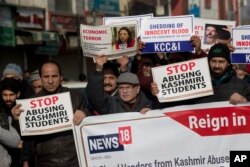India’s Supreme Court has ordered the government to protect Kashmiris following reports of a backlash against Kashmiri students and traders in the wake of a suicide attack in Indian Kashmir that killed 40 Indian paramilitary troops last week.
The deadliest attack in the restive region in three decades has triggered massive anger across India.
There have been reports of some of that anger being directed against Kashmiris studying or doing business in different parts of the country and many, fearing reprisals have returned home in recent days.
The sporadic violence included reports of some Kashmiris being beaten, threatened or facing evictions from rented accommodations. Right wing vigilantes have been blamed for the attacks.
The top court told state governments and police chiefs to ensure there are no "attacks, threats or social boycott" over the bombing.
The court asked authorities to publicize details of officials who Kashmiris can contact if they face threats or violence. The order came in response to a petition that sought protection for Kashmiris living across India.
The federal government has promised to take steps to ensure their safety and security. Several states announced that police already have set up help lines for anyone facing harassment.
“Jammu and Kashmir is an integral part of India and we all need to give them respect and, as I said, so many brave jawans [soldiers] are also Kashmiris who are losing their life on behalf of Kashmiri police,” Law and Justice Minister Ravi Shankar Prasad told reporters on Thursday. “So if there is some concern that concern must be addressed and that is how the government is going about it.”
Reports of harassment of Kashmiris in local media also prompted many Indians to use social media to offer shelter to any Kashmiri facing intimidation using hashtags such as #UnHateNow and #SafeHaven.
Kashmir, India’s only Muslim majority region, is divided between India and Pakistan, with both countries claiming all of it.
The attack, for which the Pakistan-based Islamist group Jaish-e-Mohammad claimed responsibility, has spiked tensions between the South Asian rivals. Indian Prime Minister Narendra Modi has vowed a strong response and his Pakistani counterpart has said Islamabad will retaliate if attacked.
India welcomed a United Nations Security Council statement Friday condemning the assault in Indian Kashmir. “Pakistan comes under international pressure to act against terrorists and terror groups operating from areas under its control and to take action against those responsible for Pulwama attack,” foreign ministry spokesman Raveesh Kumar tweeted.
The Security Council statement had called all countries to "cooperate actively" with the Indian government in holding the perpetrators, organizers and sponsors of such attacks accountable.
India is hoping to build diplomatic pressure on Pakistan to take action against the Jaish-e-Mohammed and its chief, Masood Azhar. Islamabad has said India must provide evidence of involvement of any Pakistani for it to investigate the blast.









